#south american poet
Text

I by Pablo Neruda (tr. W.S. Merwin), from Twenty Love Poems and a Song of Despair
Text ID:
I went alone as a tunnel. Birds fled from me,
and night invaded me with her powerful force.
#quote#typography#pablo neruda#twenty love poems and a song of despair#aesthetic#dark academia#dead academia#literature#poetry#original post#dark things#w.s. merwin#south american literature#poem#south american poet
4 notes
·
View notes
Text
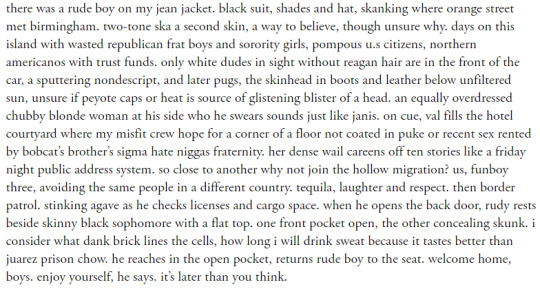
quraysh ali lansana rudie can't fail in south padre
kofi
#quraysh ali lansana#rudie can't fail in south padre#poet#poetry#poem#poems#american lit#american literature#american poetry
17 notes
·
View notes
Text
Blizzard, South Dakota
Months afterwards, I see the electrical poles
piles along the road.
When the blizzard smothered the land,
my tribe was displaced.
Like shot gun blasts heard in the distance,
those poles snapped,
weighted by ice.
A month in motels,
we ate fast food,
while the winter deer meat
expired in the basement.
Movie stars flocked to Haiti.
We watched the news,
wondered about us,
about our reservation,
about our home.
Those dialysis machines failed
without electricity,
pushed people farther away,
closer to the spirit world.
I still hear those poles
ricochet at these wakes.
— Trevino L. Brings Plenty (1976–)
When the Light of the World Was Subdued, Our Songs Came Through: A Norton Anthology of Native Nations Poetry (2020)
#Blizzard South Dakota#Trevino L. Brings Plenty#poetry#poet#poem#Native American#When the Light of the World Was Subdued Our Songs Came Through
2 notes
·
View notes
Text
a list of some autumnal movies/series 🍂
i am nothing if not an organised little goblin who can not stop themself from making a good list.
this is just in case you want something with that fall vibe but can't think of any. just close your eyes and point somewhere on this little list, or even put the numbers in a generator and go with whatever the result is ♡
winter | spring | summer
🥧 ‧₊˚ ⋅ movies ⋅˚₊‧
nosferatu (1922)
rosemary’s baby (1968)
halloween franchise (1978-)
friday the 13th franchise (1980-)
an american werewolf in london (1981)
a nightmare on elm street (1984)
ronja rövardotter (1984)
clue (1985)
princess bride (1987)
dead poets society (1989)
when harry met sally (1989)
hocus pocus (1993)
addams family values (1993)
interview with a vampie (1994)
the craft (1996)
the first wifes club (1996)
the scream franchise (1996-)
halloweentown (1998)
practical magic (1998)
you’ve got mail (1998)
the blair witch project (1999)
sleepy hollow (1999)
chocolat (2000)
amelie (2001)
the lord of the rings franchise (2001-2003)
scooby doo (2002)
pirates of the caribbean franchise (2003-2017)
north & south (2004)
pride and prejudice (2005)
the descent (2005)
the devil wears prada (2006)
el orfanato (2007)
the edge of love (2008)
twilight (2008)
julie & julia (2009)
jennifer’s body (2009)
dorian gray (2009)
coraline (2009)
true grit (2010)
the cabin in the woods (2011)
the odd life of timothy green (2012)
the conjuring franchise (2013-)
what we do in the shadows (2014)
the riot club (2014)
as above so below (2014)
the age of adaline (2015)
the witch (2015)
mary shelly (2017)
murder on the orient express (2017)
get out (2017)
a quiet place (2018 + 2020)
the guernsey literary and potato peel pie society (2018)
on the basis of sex (2018)
knives out (2019)
little women (2019)
the gentlemen (2019)
emma (2020)
ammonite (2020)
the dig (2021)
the batman (2022)
🧦 ‧₊˚ ⋅ series ⋅˚₊‧
gilmore girls (2000-2007)
outlander (2014-)
anne with on e (2017-2019)
queens gambit (2020)
moomin (1990-1992)
a discovery of witches (2018-2022)
virgin river (2019-)
supernatural (2005-2020)
shadow and bone (2021-)
vampire diaries (2009-2017)
stranger things (2016-)
the chilling adventures of sabrina (2018-2020)
once upon a time (2011-2018)
vikings valhalla (2022-)
peaky blinders (2013-2022)
downton abbey (2010-2015)
poldark (2015-2019)
dickinson (2019-2021)
killing eve (2018-2022)
ghost files/buzzfeed unsolved (2016-)
critical role (2015-)
lucifer (2016-2021)
the walking dead (2010-2022)
criminal minds (2005-2020, 2022-)
i’ll be gone in the dark (2020)
buffy the vampire slayer (1997-2003)
how to get away with murder (2014-2020)
the good fight (2017-2022)
american horror story (2011-)
teen wolf (2011-2017)
#♡ ♡ ♡#lea speaks#• comfort if you need it •#movies#comfort movies#movie recommendation#autumn aesthetic#fall aesthetic#halloween aesthetic#studyblr#cottagecore#dark academia#autumn#autumn vibes#fall#fall vibes#cozycore#cosycore#hygge#witch aesthetic
737 notes
·
View notes
Text

FATHER & SON: James Earl Jones with his Father Robert Earl Jones on Stage in the 1962 Production "Moon on a Rainbow Shawl."
Robert Earl Jones (February 3, 1910 – September 7, 2006), sometimes credited as Earl Jones, was an American actor and professional boxer. One of the first prominent Black film stars, Jones was a living link with the Harlem Renaissance of the 1920s and 1930s, having worked with Langston Hughes early in his career.
Jones was best known for his leading roles in films such as Lying Lips (1939) and later in his career for supporting roles in films such as The Sting (1973), Trading Places (1983), The Cotton Club (1984), and Witness (1985).
Jones was born in northwestern Mississippi; the specific location is unclear as some sources indicate Senatobia, while others suggest nearby Coldwater. He left school at an early age to work as a sharecropper to help his family. He later became a prizefighter. Under the name "Battling Bill Stovall", he was a sparring partner of Joe Louis.
Jones became interested in theater after he moved to Chicago, as one of the thousands leaving the South in the Great Migration. He moved on to New York by the 1930s. He worked with young people in the Works Progress Administration, the largest New Deal agency, through which he met Langston Hughes, a young poet and playwright. Hughes cast him in his 1938 play, Don't You Want to Be Free?.
Jones also entered the film business, appearing in more than twenty films. His film career started with the leading role of a detective in the 1939 race film Lying Lips, written and directed by Oscar Micheaux, and Jones made his next screen appearance in Micheaux's The Notorious Elinor Lee (1940). Jones acted mostly in crime movies and dramas after that, with such highlights as Wild River (1960) and One Potato, Two Potato (1964). In the Oscar-winning 1973 film The Sting, he played Luther Coleman, an aging grifter whose con is requited with murder leading to the eponymous "sting". In the later 20th century, Jones appeared in several other noted films: Trading Places (1983) and Witness (1985).
Toward the end of his life, Jones was noted for his stage portrayal of Creon in The Gospel at Colonus (1988), a black musical version of the Oedipus legend. He also appeared in episodes of the long-running TV shows Lou Grant and Kojak. One of his last stage roles was in a 1991 Broadway production of Mule Bone by Hughes and Zora Neale Hurston, another important writer of the Harlem Renaissance. His last film was Rain Without Thunder (1993).
Although blacklisted by the House Un-American Activities Committee in the 1950s due to involvement with leftist groups, Jones was ultimately honored with a lifetime achievement award by the U.S. National Black Theatre Festival.
Jones was married three times. As a young man, he married Ruth Connolly (died 1986) in 1929; they had a son, James Earl Jones. Jones and Connolly separated before James was born in 1931, and the couple divorced in 1933. Jones did not come to know his son until the mid-1950s. He adopted a second son, Matthew Earl Jones. Jones died on September 7, 2006, in Englewood, New Jersey, from natural causes at age 96.
THEATRE
1945 The Hasty Heart (Blossom) Hudson Theatre, Broadway
1945 Strange Fruit (Henry) McIntosh NY theater production
1948 Volpone (Commendatori) City Center
1948 Set My People Free (Ned Bennett) Hudson Theatre, Broadway
1949 Caesar and Cleopatra (Nubian Slave) National Theatre, Broadway
1952 Fancy Meeting You Again (Second Nubian) Royale Theatre, Broadway
1956 Mister Johnson (Moma) Martin Beck Theater, Broadway
1962 Infidel Caesar (Soldier) Music Box Theater, Broadway
1962 The Moon Besieged (Shields Green) Lyceum Theatre, Broadway
1962 Moon on a Rainbow Shawl (Charlie Adams) East 11th Street Theatre, New York
1968 More Stately Mansions (Cato) Broadhurst Theatre, Broadway
1975 All God's Chillun Got Wings (Street Person) Circle in the Square Theatre, Broadway
1975 Death of a Salesman (Charley)
1977 Unexpected Guests (Man) Little Theatre, Broadway
1988 The Gospel at Colonus (Creon) Lunt-Fontanne Theatre, Broadway
1991 Mule Bone (Willie Lewis) Ethel Barrymore Theatre, Broadway
FILMS
1939 Lying Lips (Detective Wenzer )
1940 The Notorious Elinor Lee (Benny Blue)
1959 Odds Against Tomorrow (Club Employee uncredited)
1960 Wild River (Sam Johnson uncredited)
1960 The Secret of the Purple Reef (Tobias)
1964 Terror in the City (Farmer)
1964 One Potato, Two Potato (William Richards)
1968 Hang 'Em High
1971 Mississippi Summer (Performer)
1973 The Sting (Luther Coleman)
1974 Cockfighter (Buford)
1977 Proof of the Man (Wilshire Hayward )
1982 Cold River (The Trapper)
1983 Trading Places (Attendant)
1983 Sleepaway Camp (Ben)
1984 The Cotton Club (Stage Door Joe)
1984 Billions for Boris (Grandaddy)
1985 Witness (Custodian)
1988 Starlight: A Musical Movie (Joe)
1990 Maniac Cop 2 (Harry)
1993 Rain Without Thunder (Old Lawyer)
TELEVISION
1964 The Defenders (Joe Dean) Episode: The Brother Killers
1976 Kojak (Judge) Episode: Where to Go if you Have Nowhere to Go?
1977 The Displaced Person (Astor) Television movie
1978 Lou Grant (Earl Humphrey) Episode: Renewal
1979 Jennifer's Journey (Reuven )Television movie
1980 Oye Ollie (Performer) Television series
1981 The Sophisticated Gents (Big Ralph Joplin) 3 episodes
1982 One Life to Live
1985 Great Performances (Creon) Episode: The Gospel at Colonus
1990 True Blue (Performer) Episode: Blue Monday
#james earl jones#black tumblr#black literature#black community#black excellence#blackexcellence365#actor#robert earl jones#stage actor
188 notes
·
View notes
Text
In light of Fall Out Boy’s GARBAGE cover of the song. Let’s learn about the original. Notice how they’re actually in chronological order instead of just random references 😒😒😒😒
1949
Harry Truman was inaugurated as U.S. president after being elected in 1948 to his own term; previously he was sworn in following the death of Franklin D. Roosevelt. He authorized the use of atomic bombs on Hiroshima and Nagasaki in Japan during World War II, on August 6 and August 9, 1945, respectively.
Doris Day enters the public spotlight with the films My Dream Is Yours and It’s a Great Feeling as well as popular songs like “It’s Magic”; divorces her second husband.
Red China: The Communist Party of China wins the Chinese Civil War, establishing the People’s Republic of China.
Johnnie Ray signs his first recording contract with Okeh Records, although he would not become popular for another two years.
South Pacific, the prize-winning musical, opens on Broadway on April 7.
Walter Winchell is an aggressive radio and newspaper journalist credited with inventing the gossip column.
Joe DiMaggio and the New York Yankees go to the World Series five times in the 1940s, winning four of them.
1950
Joe McCarthy, the US Senator, gains national attention and begins his anti-communist crusade with his Lincoln Day speech.
Richard Nixon is first elected to the United States Senate.
Studebaker, a popular car company, begins its financial downfall.
Television is becoming widespread throughout Europe and North America.
North Korea and South Korea declare war after Northern forces stream south on June 25.
Marilyn Monroe soars in popularity with five new movies, including The Asphalt Jungle and All About Eve, and attempts suicide after the death of friend Johnny Hyde who asked to marry her several times, but she refused respectfully. Monroe would later (1954) be married for a brief time to Joe DiMaggio (mentioned in the previous verse).
1951
The Rosenbergs, Ethel and Julius, were convicted on March 29 for espionage.
H-Bomb is in the middle of its development as a nuclear weapon, announced in early 1950 and first tested in late 1952.
Sugar Ray Robinson, a champion welterweight boxer.
Panmunjom, the border village in Korea, is the location of truce talks between the parties of the Korean War.
Marlon Brando is nominated for the Academy Award for Best Actor for his role in A Streetcar Named Desire.
The King and I, musical, opens on Broadway on March 29.
The Catcher in the Rye, a controversial novel by J. D. Salinger, is published.
1952
Dwight D. Eisenhower is first elected as U.S. president, winning by a landslide margin of 442 to 89 electoral votes.
The vaccine for polio is privately tested by Jonas Salk.
England’s got a new queen: Queen Elizabeth II succeeds to the throne upon the death of her father, George VI, and is crowned the next year.
Rocky Marciano defeats Jersey Joe Walcott, becoming the world Heavyweight champion.
Liberace has a popular 1950s television show for his musical entertainment.
Santayana goodbye: George Santayana, philosopher, essayist, poet, and novelist, dies on September 26.
1953
Joseph Stalin dies on March 5, yielding his position as leader of the Soviet Union.
Georgy Maksimilianovich Malenkov succeeds Stalin for six months following his death. Malenkov had presided over Stalin’s purges of party “enemies”, but would be spared a similar fate by Nikita Khrushchev mentioned later in verse.
Gamal Abdel Nasser acts as the true power behind the new Egyptian nation as Muhammad Naguib’s minister of the interior.
Sergei Prokofiev, the composer, dies on March 5, the same day as Stalin.
Winthrop Rockefeller and his wife Barbara are involved in a highly publicized divorce, culminating in 1954 with a record-breaking $5.5 million settlement.
Roy Campanella, an African-American baseball catcher for the Brooklyn Dodgers, receives the National League’s Most Valuable Player award for the second time.
Communist bloc is a group of communist nations dominated by the Soviet Union at this time. Probably a reference to the Uprising of 1953 in East Germany.
1954
Roy Cohn resigns as Joseph McCarthy’s chief counsel and enters private practice with the fall of McCarthy. He also worked to prosecute the Rosenbergs, mentioned earlier.
Juan Perón spends his last full year as President of Argentina before a September 1955 coup.
Arturo Toscanini is at the height of his fame as a conductor, performing regularly with the NBC Symphony Orchestra on national radio.
Dacron is an early artificial fiber made from the same plastic as polyester.
Dien Bien Phu falls. A village in North Vietnam falls to Viet Minh forces under Vo Nguyen Giap, leading to the creation of North Vietnam and South Vietnam as separate states.
“Rock Around the Clock” is a hit single released by Bill Haley & His Comets in May, spurring worldwide interest in rock and roll music.
1955
Albert Einstein dies on April 18 at the age of 76.
James Dean achieves success with East of Eden and Rebel Without a Cause, gets nominated for an Academy Award for Best Actor, and dies in a car accident on September 30 at the age of 24.
Brooklyn’s got a winning team: The Brooklyn Dodgers win the World Series for the only time before their move to Los Angeles.
Davy Crockett is a Disney television miniseries about the legendary frontiersman of the same name. The show was a huge hit with young boys and inspired a short-lived “coonskin cap” craze.
Peter Pan is broadcast on TV live and in color from the 1954 version of the stage musical starring Mary Martin on March 7. Disney released an animated version the previous year.
Elvis Presley signs with RCA Records on November 21, beginning his pop career.
Disneyland opens on July 17, 1955 as Walt Disney’s first theme park.
1956
Brigitte Bardot appears in her first mainstream film And God Created Woman and establishes an international reputation as a French “sex kitten”.
Budapest is the capital city of Hungary and site of the 1956 Hungarian Revolution.
Alabama is the site of the Montgomery Bus Boycott which ultimately led to the removal of the last race laws in the USA. Rosa Parks and Martin Luther King, Jr figure prominently.
Nikita Khrushchev makes his famous Secret Speech denouncing Stalin’s “cult of personality” on February 25.
Princess Grace Kelly releases her last film, High Society, and marries Prince Rainier III of Monaco.
Peyton Place, the best-selling novel by Grace Metalious, is published. Though mild compared to today’s prime time, it shocked the reserved values of the 1950s.
Trouble in the Suez: The Suez Crisis boils as Egypt nationalizes the Suez Canal on October 29.
1957
Little Rock, Arkansas is the site of an anti-integration standoff, as Governor Orval Faubus stops the Little Rock Nine from attending Little Rock Central High School and President Dwight D. Eisenhower deploys the 101st Airborne Division to counteract him.
Boris Pasternak, the Russian author, publishes his famous novel Doctor Zhivago.
Mickey Mantle is in the middle of his career as a famous New York Yankees outfielder and American League All-Star for the sixth year in a row.
Jack Kerouac publishes his first novel in seven years, On the Road.
Sputnik becomes the first artificial satellite, launched by the Soviet Union on October 4, marking the start of the space race.
Chou En-Lai, Premier of the People’s Republic of China, survives an assassination attempt on the charter airliner Kashmir Princess.
Bridge on the River Kwai is released as a film adaptation of the 1954 novel and receives seven Academy Awards, including Best Picture.
1958
Lebanon is engulfed in a political and religious crisis that eventually involves U.S. intervention.
Charles de Gaulle is elected first president of the French Fifth Republic following the Algerian Crisis.
California baseball begins as the Brooklyn Dodgers and New York Giants move to California and become the Los Angeles Dodgers and San Francisco Giants. They are the first major league teams west of Kansas City.
Charles Starkweather Homicide captures the attention of Americans, in which he kills eleven people between January 25 and 29 before being caught in a massive manhunt in Douglas, Wyoming.
Children of Thalidomide: Mothers taking the drug Thalidomide had children born with congenital birth defects caused by the sleeping aid and antiemetic, which was also used at times to treat morning sickness.
1959
Buddy Holly dies in a plane crash on February 3 with Ritchie Valens and The Big Bopper, in a day that had a devastating impact on the country and youth culture. Joel prefaces the lyric with a Holly signature vocal hiccup: “Uh-huh, uh-huh.”
Ben-Hur, a film based around the New Testament starring Charlton Heston, wins eleven Academy Awards, including Best Picture.
Space Monkey: Able and Miss Baker return to Earth from space aboard the flight Jupiter AM-18.
The Mafia are the center of attention for the FBI and public attention builds to this organized crime society with a historically Sicilian-American origin.
Hula hoops reach 100 million in sales as the latest toy fad.
Fidel Castro comes to power after a revolution in Cuba and visits the United States later that year on an unofficial twelve-day tour.
Edsel is a no-go: Production of this car marque ends after only three years due to poor sales.
1960
U-2: An American U-2 spy plane piloted by Francis Gary Powers was shot down over the Soviet Union, causing the U-2 Crisis of 1960.
Syngman Rhee was rescued by the CIA after being forced to resign as leader of South Korea for allegedly fixing an election and embezzling more than US $20 million.
Payola, illegal payments for radio broadcasting of songs, was publicized due to Dick Clark’s testimony before Congress and Alan Freed’s public disgrace.
John F. Kennedy beats Richard Nixon in the November 8 general election.
Chubby Checker popularizes the dance The Twist with his cover of the song of the same name.
Psycho: An Alfred Hitchcock thriller, based on a pulp novel by Robert Bloch and adapted by Joseph Stefano, which becomes a landmark in graphic violence and cinema sensationalism. The screeching violins heard briefly in the background of the song are a trademark of the film’s soundtrack.
Belgians in the Congo: The Republic of the Congo (Leopoldville) was declared independent of Belgium on June 30, with Joseph Kasavubu as President and Patrice Lumumba as Prime Minister.
1961
Ernest Hemingway commits suicide on July 2 after a long battle with depression.
Adolf Eichmann, a “most wanted” Nazi war criminal, is traced to Argentina and captured by Mossad agents. He is covertly taken to Israel where he is put on trial for crimes against humanityin Germany during World War II, convicted, and hanged.
Stranger in a Strange Land, written by Robert A. Heinlein, is a breakthrough best-seller with themes of sexual freedom and liberation.
Bob Dylan is signed to Columbia Records after a New York Times review by critic Robert Shelton.
Berlin is separated into West Berlin and East Berlin, and from the rest of East Germany, when the Berlin Wall is erected on August 13 to prevent citizens escaping to the West.
The Bay of Pigs Invasion fails, an attempt by United States-trained Cuban exiles to invade Cuba and overthrow Fidel Castro.
1962
Lawrence of Arabia: The Academy Award-winning film based on the life of T. E. Lawrence starring Peter O’Toole premieres in America on December 16.
British Beatlemania: The Beatles, a British rock group, gain Ringo Starr as drummer and Brian Epstein as manager, and join the EMI’s Parlophone label. They soon become the world’s most famous rock band, with the word “Beatlemania” adopted by the press for their fans’ unprecedented enthusiasm. It also began the British Invasion in the United States.
Ole’ Miss: James Meredith integrates the University of Mississippi
John Glenn: Flew the first American manned orbital mission termed “Friendship 7” on February 20.
Liston beats Patterson: Sonny Liston and Floyd Patterson fight for the world heavyweight championship on September 25, ending in a first-round knockout. This match marked the first time Patterson had ever been knocked out and one of only eight losses in his 20-year professional career.
1963
Pope Paul VI: Cardinal Giovanni Montini is elected to the papacy and takes the papal name of Paul VI.
Malcolm X makes his infamous statement “The chickens have come home to roost” about the Kennedy assassination, thus causing the Nation of Islam to censor him.
British politician sex: The British Secretary of State for War, John Profumo, has a relationship with a showgirl, and then lies when questioned about it before the House of Commons. When the truth came out, it led to his own resignation and undermined the credibility of the Prime Minister.
JFK blown away: President John F. Kennedy is assassinated on November 22 while riding in an open convertible through Dallas.
1965
Birth control: In the early 1960s, oral contraceptives, popularly known as “the pill”, first go on the market and are extremely popular. Griswold v. Connecticut in 1965 challenged a Connecticut law prohibiting contraceptives. In 1968, Pope Paul VI released a papal encyclical entitled Humanae Vitae which declared artificial birth control a sin.
Ho Chi Minh: A Vietnamese communist, who served as President of Vietnam from 1954–1969. March 2 Operation Rolling Thunder begins bombing of the Ho Chi Minh Trail supply line from North Vietnam to the Vietcong rebels in the south. On March 8, the first U.S. combat troops, 3,500 marines, land in South Vietnam.
1968
Richard Nixon back again: Former Vice President Nixon is elected President in 1968.
1969
Moonshot: Apollo 11, the first manned lunar landing, successfully lands on the moon.
Woodstock: Famous rock and roll festival of 1969 that came to be the epitome of the counterculture movement.
1974–75
Watergate: Political scandal that began when the Democratic National Committee’s headquarters at the Watergate office complex in Washington, DC was broken into. After the break-in, word began to spread that President Richard Nixon (a Republican) may have known about the break-in, and tried to cover it up. The scandal would ultimately result in the resignation of President Nixon, and to date, this remains the only time that anyone has ever resigned the United States Presidency.
Punk rock: The Ramones form, with the Sex Pistols following in 1975, bringing in the punk era.
1976–77
(An item from 1977 comes before three items from 1976 to make the song scan.)
Menachem Begin becomes Prime Minister of Israel in 1977 and negotiates the Camp David Accords with Egypt’s president in 1978.
Ronald Reagan was elected President of the United States in 1980, but he first attempted to run for the position in 1976.
Palestine: a United Nations resolution that calls for an independent Palestinian state and to end the Israeli occupation.
Terror on the airline: Numerous aircraft hijackings take place, specifically, the Palestinian hijack of Air France Flight 139 and the subsequent Operation Entebbe in Uganda.
1979
Ayatollah’s in Iran: During the Iranian Revolution of 1979, the West-backed and secular Shah is overthrown as the Ayatollah Ruhollah Khomeini gains power after years in exile and forces Islamic law.
Russians in Afghanistan: Following their move into Afghanistan, Soviet forces fight a ten-year war, from 1979 to 1989.
1983
Wheel of Fortune: A hit television game show which has been TV’s highest-rated syndicated program since 1983.
Sally Ride: In 1983 she becomes the first American woman in space. Ride’s quip from space “Better than an E-ticket”, harkens back to the opening of Disneyland mentioned earlier, with the E-ticket purchase needed for the best rides.
Heavy metal suicide: In the 1980s Ozzy Osbourne and the bands Judas Priest and Metallica were brought to court by parents who accused the musicians of hiding subliminal pro-suicide messages in their music.
Foreign debts: Persistent U.S. trade deficits
Homeless vets: Veterans of the Vietnam War, including many disabled ex-military, are reported to be left homeless and impoverished.
AIDS: A collection of symptoms and infections in humans resulting from the specific damage to the immune system caused by infection with the human immunodeficiency virus (HIV). It is first detected and recognized in the 1980s, and was on its way to becoming a pandemic.
Crack cocaine use surged in the mid-to-late 1980s.
1984
Bernie Goetz: On December 22, Goetz shot four young men who he said were threatening him on a New York City subway. Goetz was charged with attempted murder but was acquitted of the charges, though convicted of carrying an unlicensed gun.
1988
Hypodermics on the shore: Medical waste was found washed up on beaches in New Jersey after being illegally dumped at sea. Before this event, waste dumped in the oceans was an “out of sight, out of mind” affair. This has been cited as one of the crucial turning points in popular opinion on environmentalism.
1989
China’s under martial law: On May 20, China declares martial law, enabling them to use force of arms against protesting students to end the Tiananmen Square protests.
Rock-and-roller cola wars: Soft drink giants Coke and Pepsi each run marketing campaigns using rock & roll and popular music stars to reach the teenage and young adult demographic.
Short summaries of all 119 references mentioned in the song, you’re welcome.
#look fall out boy is one of my fave bands but this is inexcusable#fall out boy#Billy Joel#music#Spotify
290 notes
·
View notes
Text
Public Domain Black History Books
For the day Frederick Douglass celebrated as his birthday (February 14, Douglass Day, and the reason February is Black History Month), here's a selection of historical books by Black authors covering various aspects of Black history (mostly in the US) that you can download For Free, Legally And Easily!
Slave Narratives
This comprised a hugely influential genre of Black writing throughout the 1800s - memoirs of people born (or kidnapped) into slavery, their experiences, and their escapes. These were often published to fuel the abolitionist movement against slavery in the 1820s-1860s and are graphic and uncompromising about the horrors of slavery, the redemptive power of literacy, and the importance of abolitionist support.
Narrative of the Life of Frederick Douglass - 1845 - one of the most iconic autobiographies of the 1800s, covering his early life when he was enslaved in Maryland, and his escape to Massachusetts where he became a leading figure in the abolition movement.
Running a Thousand Miles for Freedom by William and Ellen Craft - 1860 - the memoir of a married couple's escape from slavery in Georgia, to Philadelphia and eventually to England. Ellen Craft was half-white, the child of her enslaver, but she could pass as white, and she posed as her husband William's owner to get them both out of the slave states. Harrowing, tense, and eminently readable - I honestly think Part 1 should be assigned reading in every American high school in the antebellum unit.
Incidents in the Life of a Slave Girl by Harriet Jacobs writing under the name Linda Brent - 1861 - writing specifically to reach white women and arguing for the need for sisterhood and solidarity between white and Black women, Jacobs writes of her childhood in slavery and how terrible it was for women and mothers even under supposedly "nice" masters including supposedly "nice" white women.
Twelve Years a Slave by Solomon Northup - 1853 - Born a free Black man in New York, Northup was kidnapped into slavery as an adult and sold south to Louisiana. This memoir of the brutality he endured was the basis of the 2013 Oscar-winning movie.
Early 1900s Black Life and Philosophy
Slavery is of course not the only aspect of Black history, and writers in the late 1800s and early 1900s had their own concerns, experiences, and perspectives on what it meant to be Black.
Up From Slavery by Booker T. Washington - 1901 - an autobiography of one of the most prominent African-American leaders and educators in the late 1800s/early 1900s, about his experiences both learning and teaching, and the power and importance of equal education. Race relations in the Reconstruction era Southern US are a major concern, and his hope that education and equal dignity could lead to mutual respect has... a long way to go still.
The Souls of Black Folk by W.E.B. Du Bois - 1903 - an iconic work of sociology and advocacy about the African-American experience as a people, class, and community. We read selections from this in Anthropology Theory but I think it should be more widely read than just assigned in college classes.
Darkwater: Voices from Within the Veil by W.E.B. Du Bois - 1920 - collected essays and poems on race, religion, gender, politics, and society.
A Negro Explorer at the North Pole by Matthew Henson - 1908 - Black history doesn't have to be about racism. Matthew Henson was a sailor and explorer and was the longtime companion and expedition partner of Robert Peary. This is his adventure-memoir of the expedition that reached the North Pole. (Though his descriptions of the Indigenous Greenlandic Inuit people are... really paternalistic in uncomfortable ways even when he's trying to be supportive.)
Poetry
Standard Ebooks also compiles poetry collections, and here are some by Black authors.
Langston Hughes - 1920s - probably the most famous poet of the Harlem Renaissance.
James Weldon Johnson - early 1900s through 1920s - tends to be in a more traditionalist style than Hughes, and he preferred the term for the 1920s proliferation of African-American art "the flowering of Negro literature."
Sarah Louisa Forten Purvis - 1830s - a Black abolitionist poet, this is more of a chapbook of her work that was published in newspapers than a full book collection. There are very common early-1800s poetry themes of love, family, religion, and nostalgia, but overwhelmingly her topic was abolition and anti-slavery, appealing to a shared womanhood.
Science Fiction
This is Black history to me - Samuel Delany's first published novel, The Jewels of Aptor, a sci-fi adventure from the early 60s that encapsulates a lot of early 60s thoughts and anxieties. New agey religion, forgotten technology mistaken for magic, psychic powers, nuclear war, post-nuclear society that feels more like a fantasy kingdom than a sci-fi world until they sail for the island that still has all the high tech that no one really knows how to use... it's a quick and entertaining read.
59 notes
·
View notes
Photo

Sitting Bull
Sitting Bull (Tatanka Iyotanka, l. c. 1837-1890) was a Hunkpapa Sioux holy man, warrior, leader, and symbol of traditional Sioux values and resistance to the United States' expansionist policies. He is among the best-known Native American chiefs of the 19th century and remains as famous today as he was when he led his people.
He is widely known for his part in the Battle of the Little Bighorn in June 1876 and his later celebrity as a performer in Buffalo Bill's Wild West Show, but, for the Sioux, Sitting Bull is celebrated as the embodiment of the four cardinal virtues of his people: courage, fortitude, generosity, and wisdom. He is also recognized for his refusal to abandon the traditions of his people and his efforts to preserve their culture. Although famous as a holy man, prophet, war chief, and hunter, Sitting Bull was also a poet and composer, as well-known among his people for his rapport with wild animals and herbal knowledge as for his leadership.
He was killed while resisting arrest at the Standing Rock Agency Reservation in South Dakota on 15 December 1890 and was buried at Fort Yates in North Dakota. His remains were exhumed by family members in the 1950s and interred at Mobridge, South Dakota, near where he was thought to have been born. Debate continues over whether these remains are those of Sitting Bull, and historians also offer differing views on his legacy. His reputation as a great leader of his people, however, is unchallenged as he continues to be recognized as a symbol of Native American pride, honor, and traditional values, as well as for his stand against injustice.
Youth & Name
Little is known of Sitting Bull's life before the age of 14. His date of birth, given as 1831, 1832, 1834, or 1837, is debated, as was his birthplace until fairly recently. He is now understood to have been born on the Yellowstone River (known to the Sioux as Elk River) in modern-day Montana and was named Jumping Badger (Hoka Psice). He quickly earned the nickname Slow (Hunkesni), owing, according to scholar Robert. M. Utley, to "his willful and deliberate ways" (6). His father was Chief Sitting Bull of the Hunkpapa Sioux, and his mother was Her-Holy-Door from a respectable Hunkpapa family. He had two sisters and a half-brother but would later adopt others as his brothers, and these are sometimes mistakenly referenced as biological siblings.
Chief Sitting Bull taught his son to ride, hunt, and shoot expertly before the boy was ten years old. Young Slow was an excellent shot with bow and arrow and became so closely associated with horses that his peers joked how he even walked as though he were on horseback. When he was 14, he joined a war party against the Crow and "counted coup" against a Crow warrior, knocking him from his horse where he was then killed by another of the party. For this act of courage – defeating an enemy without killing him – Chief Sitting Bull gave his name to his son and assumed the name Jumping Bull. "Sitting Bull" – Tatanka Iyotanka (literally "Buffalo Who Sits Down") – fit the youth's personality as, "according to fellow tribesmen, suggested an animal possessed of great endurance, his build much admired by the people, and when brought to bay, planted immovably on his haunches to fight on to the death" (Utley, 15).
Later acquaintances and writers would claim the name was given him due to his stubbornness or, according to Sioux writer and physician Charles A. Eastman, that he was given the name after forcing a buffalo calf to sit down. The name was actually given in accordance with the tradition whereby a father passed his own name to his son when the boy was recognized as attaining manhood.
Between the ages of 14 and 20, Sitting Bull led his own war parties, and his name became famous among his enemies as a formidable warrior. Utley describes him at around the age of 20:
A heavy, muscular frame, a big chest, and a large head, he impressed people as short and stocky, although he stood only two inches under six feet. His dark hair, often braided on one side with otter fur and allowed to hang loose on the other, reached his shoulders. A severe part over the center of the scalp glistened with a heavy streak of crimson paint. A low forehead surmounted piercing eyes, a flat nose, and thin lips. Although dexterous afoot and superbly agile mounted, he appeared to some as awkward and even clumsy. (19-20)
Around 1857, in a clash with an Assiniboine band, Sitting Bull spared a 13-year-old boy whom he later adopted as a younger brother. When Sitting Bull's father was killed in battle with the Crow in 1859, the boy took the name Jumping Bull and would remain by Sitting Bull's side for the rest of his life.
Continue reading...
40 notes
·
View notes
Text
social media universe masterlist

you're losing me
pairing: jacaerys velaryon/popstar!reader/aemond targaryen
description: after a gruesome breakup with jace - his billionaire uncle offers you a proposal that you can't resist. [fake dating trope]

illicit affairs
pairing: aemond targaryen/kpop-idol!reader
description: it was forbidden to date a man like him. but still, you choose to fall. [cheating trope]

cats and dogs
pairing: aemond targaryen/model-influencer!reader
description: you meet him in the animal shelter.
emma falls in love
pairing: aemond targaryen/reader
description: fake dating trope for taylor swift tickets.

i'm a m*therfucking starboy
pairing: prince!daemon targaryen/model!reader
description: you meet the infamous prince of dragonstone. [enemies to lovers trope]
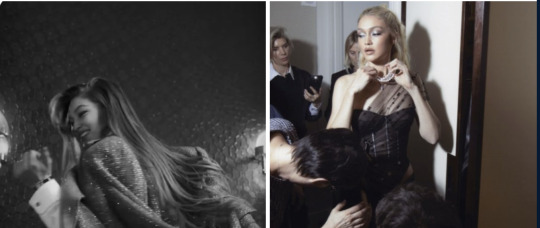
fence
pairing: daemon targaryen/reader
description: he's your dad's best friend.

therese ➺ milk matches her underwear ➺ horses, cars and cowboys do
pairing: millionaire!daemon targaryen/lowkey-actress!reader
description: in where, your private life becomes public. [secret relationship trope]

two white butterflies ➺ how to disappear ➺ miss american pie
pairing: accomplished!daemon targaryen/singer!reader
description: daemon begins dating a singer who hates the spotlight.
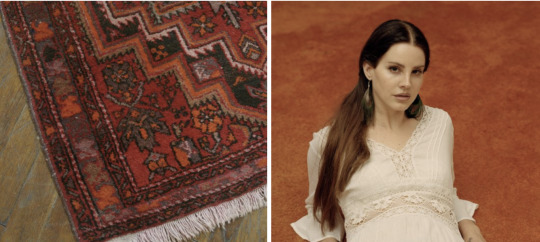
i shouldn't cry
pairing: prince!daemon targaryen/heiress!reader (south east asian reader)
description: prince daemon in love with a rich girl.

false god
pairing: prince!daemon targaryen/singer!reader
description: you are forced to choose between family and ambition.

brooklyn baby
pairing: cregan stark/ice-skater!reader
description: he's on the hockey team, and you're a figure skater.

dorothea
pairing: helaena targaryen/cam-girl!reader
description: helaena visits your onlyfans.

taco truck x vb
pairing: otto hightower/socialite-actress!reader
description: you date ur dad's coo

riptide ➺ two
pairing: college student!aegon targaryen/ceo!reader
description: aegon's friends have been wondering how he gets to have the coolest things without having a job.

smooth operator
pairing: driver!aegon targaryen/verstappen!reader
description: he falls in love with his teammate's sister.

cinnamon
pairing: aegon targaryen/reader
description: aegon meets a girl in his coffee shop.

i know places
pairing: streamer!aegon/non-showbiz!reader
description: no one knows who his gf is.

i did one thing right
description: a famous indie actress is married to a poet. but he refuses to write about her.
pairing: jace velaryon/actress!reader
#daemon targaryen x reader#daemon targaryen#daemon x reader#daemon targaryen imagine#aemond x reader#aemond targaryen x you#aemond x you#daemon targaryen x oc#house of the dragon
186 notes
·
View notes
Text
April is National Poetry Month (In the U.S. anyway)
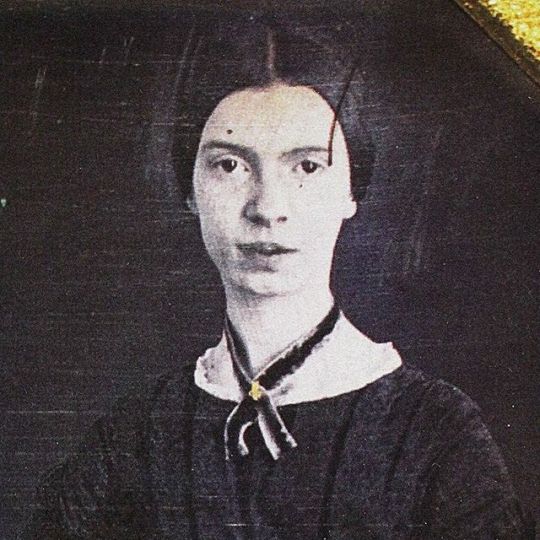
Emily Dickinson (American,1830-1886)
Emily Dickinson was a poet whose work was not widely known until after her death. She was born in Amherst, Massachusetts into an affluent, influential family. Her grandfather was a founder of the prestigious Amherst College and her father was a Massachusetts legislator in the U.S. Congress.
Emily Dickinson briefly attended college at what was then Mount Holyoke Women's Semanary and currently known Mount Holyoke College — a prestigious women's college in South Hadley, Massachusetts. Contrary to common perception, Emily only became a complete recluse later in life, around 1860, though she rarely left her hometown of Amherst. She was devoted to her family and baked bread daily for them. She and her younger sister Lavinia were very close and her brother Austin and his wife and children lived next door to the Dickinson home in what is called The Evergreens.
Emily Dickinson's reclusive period was also her most artistically productive. She collected her poems on pieces of paper which she would then sew together as a form of binding. These little books were discovered by her sister shortly after Emily's death in 1886. The first volume of her poems was published in late 1890.
Emily Dickinson is now considered one of the finest and most original poets in the English language.
Sources:
The Emily Dickinson Museaum
The Poetry Foundation
EmilyDickinson.net

Otis Allen Bullard (American, 1816-1853) • Emily Elizabeth, Austin, and Lavinia Dickinson • c. 1840
I heard a Fly buzz - when I died - (591)
I heard a Fly buzz– when I died–
The Stillness in the Room
Was like the Stillness in the Air –
Between the Heaves of Storm–
The Eyes around– had wrung them dry–
And Breaths were gathering firm
For that last Onset– when the King
Be witnessed– in the Room–
I willed my Keepsakes– Signed away
What portions of me be
Assignable– and then it was
There interposed a Fly–
With Blue– uncertain– stumbling Buzz–
Between the light– and me –
And then the Windows failed – and then
I could not see to see–
#art#american historical figure#emily dickinson#american poet#amherst massachusetts#women's history month#poetry#poem#19th century poetry#woman poet#otis allen bullard#family portrait#portrait painting#american painter#american art#pagan sphinx art blog#art history#painting
24 notes
·
View notes
Text

Inward by Yung Pueblo
#inward#yung pueblo#quote#typography#diego perez#literature#aesthetic#dark academia#light academia#celestial#the self#bodymind#stars#modern poetry#south american poets
720 notes
·
View notes
Text

The Palestinian town of Jericho has named a street after Aaron Bushnell, the US air force member who set himself on fire outside the Israeli embassy in Washington to protest against the war in Gaza.
The 25-year-old, who died on 25 February, “sacrificed everything” for Palestinians, said the mayor of Jericho, Abdul Karim Sidr, as the street sign was unveiled on Sunday.
“We didn’t know him, and he didn’t know us. There were no social, economic or political ties between us. What we share is a love for freedom and a desire to stand against these attacks [on Gaza],” the mayor told a small crowd gathered on the new Aaron Bushnell Road.
[...]
In Jericho, Bushnell’s extreme act is seen as the most powerful expression of grassroots solidarity. Amani Rayan, a Jericho city council member who grew up in Gaza and moved to the occupied West Bank to study aged 19, said: “He [Bushnell] sacrificed the most precious thing, whatever your beliefs. This man gave all his privileges for the children of Gaza... He was a soldier who with his last breath, despite the pain, shouted ‘free Palestine’. This means he was clear to the depths of his being about why he was doing it.”
[...]
Jericho named the street just a fortnight after Bushnell’s death. “We made a quick decision so we would be first,” Sidr said. They also named a square for South Africa after its government took Israel to the international court of justice, accusing it of genocide.
“These names will focus attention of both the locals and visitors,” Sidr said, adding that they were following a precedent set after the death of the activist Rachel Corrie. A street in Ramallah was named for the American after she was crushed to death by a bulldozer in 2003 while trying to prevent the Israeli army destroying homes in Gaza.
[...]
Aaron Bushnell Street is in the south of the city in a popular area of villas and parks, where people go for horse-riding and go-carting. It branches off from Mahmoud Darwish Street, named after the unofficial national poet of Palestine.
Rayan said: “Here Aaron Bushnell and Mahmoud Darwish meet. Both are powerful names in the Palestinian story.” Like many in Jericho she hopes Bushnell’s family will visit. “We want to thank them for raising him and giving him that moral attitude.”
-- From "Palestinian town of Jericho names street after US soldier who set himself on fire" by Emma Graham-Harrison, 10 Mar 2024
24 notes
·
View notes
Text

The Nobel prize in literature has been awarded to 64-year-old Norwegian author Jon Fosse “for his innovative plays and prose which give voice to the unsayable”. His works include the Septology series of novels, Aliss at the Fire, Melancholy and A Shining.
“His huge oeuvre, spanning a variety of genres, comprises about 40 plays and a wealth of novels, poetry collections, essays, children’s books and translations,” said Anders Olsson, chairman of the Nobel committee for literature. “Fosse blends a rootedness in the language and nature of his Norwegian background with artistic techniques in the wake of modernism.”
“I am overwhelmed, and somewhat frightened. I see this as an award to the literature that first and foremost aims to be literature, without other considerations,” Fosse said in a statement.
He also told the Norwegian public broadcaster NRK that he was “surprised but also not” to have won. “I’ve been part of the discussion for 10 years and have more and less tentatively prepared myself that this could happen,” he said.
Jacques Testard, Fosse’s fiction publisher, said on hearing the news: “He is an exceptional writer, who has managed to find a totally unique way of writing fiction. As his Norwegian editor Cecilie Seiness put it recently in an interview: if you open any book by Jon and read a couple of lines, it couldn’t be written by anyone else.
“His fiction is incantatory, mystical, and rooted in the landscape of the western fjords where he grew up,” Testard added. “It’s very important to remember that he writes in Nynorsk or New Norwegian, a minority language in Norway, a political act in itself. He’s also an exceptional playwright and poet. He’s an incredible mind, and it couldn’t have happened to a nicer person.”
The Norwegian writer’s English translator Damion Searls said he is thrilled Fosse’s work will now find an even wider audience. “I first brought Fosse’s fiction into English almost 20 years ago. I read Melancholy in German and immediately felt that the work was brilliant and needed to be translated. I found an American publisher and a co-translator, and started learning Norwegian”, he told the Guardian. “I have since translated around 10 books of his, depending on how you count them, including a libretto, a play and a forthcoming children’s book.”
Though the author and translator mostly communicate via email and hadn’t met in person until the 2022 International Booker prize events in London, Searls considers Fosse a friend. “He is the same kind, wise, modest, friendly, supportive person over email as you would expect from his novels, and corresponding with him has always brought me the same kind of peace and serenity his novels so magically impart.”
Born in 1959 in Haugesund on the west coast of Norway, Fosse grew up in Strandebarm. Aged seven, he nearly died in an accident, which he said was “the most important experience” of his childhood and one that “created” him as an artist. In his adolescence, he aspired to be a rock guitarist, before turning his ambitions to writing.
His debut novel, Raudt, svart (Red, Black), was published in 1983. His first play to be performed, Og aldri skal vi skiljast (And Never Shall We Part), was staged at the National Theater in Bergen in 1994. Yet, the first play he wrote, Nokon kjem til å komme (Someone Is Going to Come), would lead to his breakthrough in 1999 when French director Claude Régy staged it in Nanterre.
Fosse went on to become the most-performed Norwegian playwright after Henrik Ibsen. He has written more than 30 plays, including Namnet (The Name), Vinter (Winter) and Ein sommars dag (A Summer’s Day). His longer works include the Septology trilogy, the third volume of which was shortlisted for the international Booker prize in 2022.
Septology, which Fosse started during a pause from playwriting and after converting to Catholicism in 2013, is about an ageing painter, Asle, living alone on the south-west coast of Norway and reflecting on his life. There in Bjørgvin lives another Asle, who is also a painter but struggles with alcohol. The doppelgangers are consumed by the same existential questions about death, faith and love.
In 1989, the same year that Fosse’s novel Naustet (“Boathouse”) came out, the writer taught the fellow Norwegian author Karl Ove Knausgård, who was a student at the Academy of Writing in Hordaland. “Fosse’s voice is unmistakable in whatever he writes, and is never anything if not present,” wrote Knausgård in 2019.
Fosse’s UK publisher is Fitzcarraldo Editions, which also publishes Annie Ernaux, the winner of the 2022 Nobel prize in literature. Fosse’s win marks the London-based independent publisher’s third win in five years: Olga Tokarczuk was made laureate in 2018. The prize was postponed and awarded in 2019 instead due to a sexual assault scandal involving the husband of one of the academy’s former members which led to several members resigning.
Fosse resides between Austria and Norway. He will receive the prize at a ceremony in Stockholm on 10 December. He will receive 11m SEK (£821,209), up from 10m SEK awarded last year.
Daily inspiration. Discover more photos at Just for Books…?
37 notes
·
View notes
Text
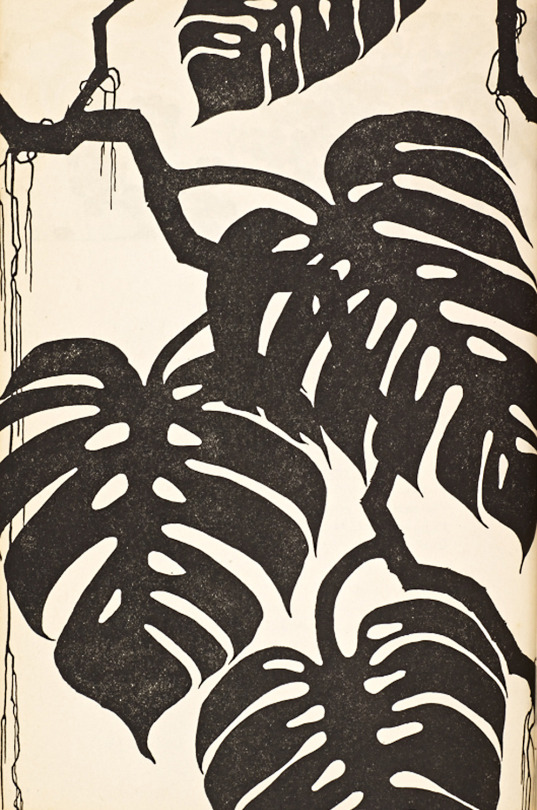
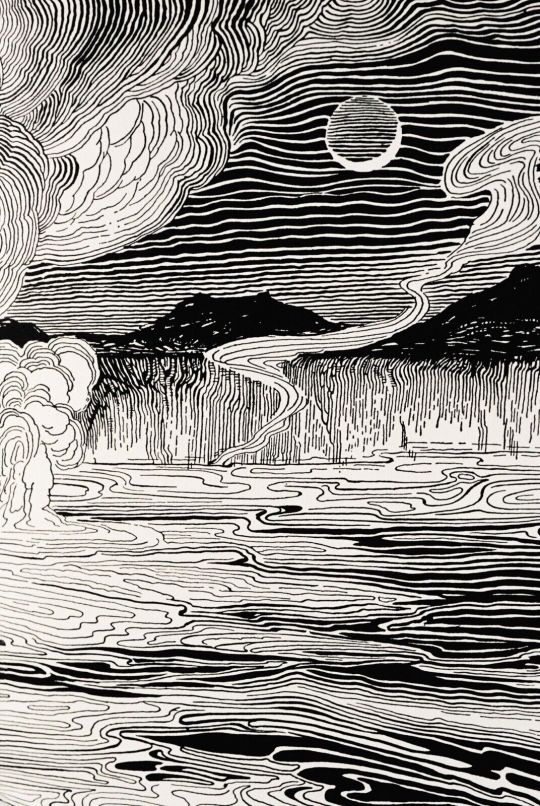

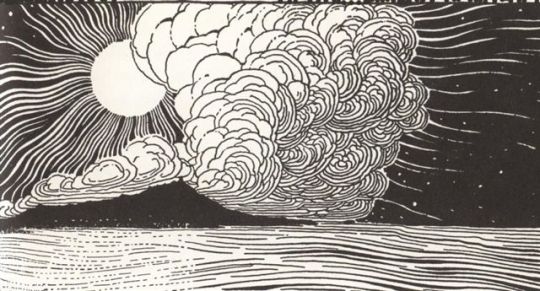
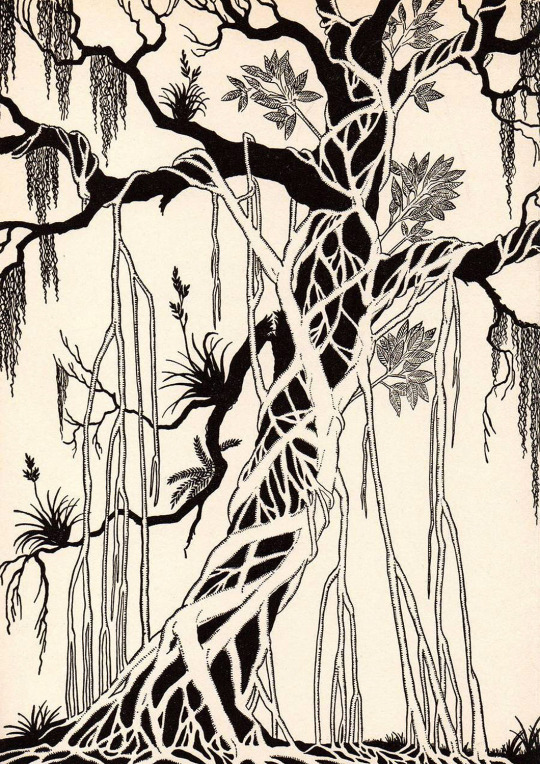
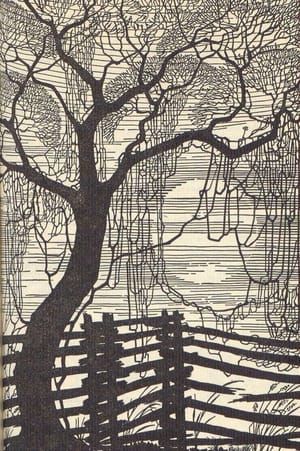
Don Blanding (1894-1957) was an American poet who loved the climate of Hawaii and was sometimes described as "poet laureate of Hawaii".
Paul Sanderson from South California writes in his blog:
"I’m willing to bet most people have never heard of Don Blanding—the early 20th century poet who illustrated his own work with elaborate pen-and-ink drawings—but I grew up in a household filled with Blanding’s books, prints, and snippets of his verse running through my head. My dad was a fan from my earliest memory and spoke of the poet’s richly woven tableaux as if the places he wrote of might actually exist in the real world and not just in the imagination. All Blanding’s poetry depict highly romantic and idealized locales—South Sea islands awash in color, the scent of jasmine in the air; jungle temples choked in vines and brimming with treasure; Oriental ports-of-call populated with mysterious characters in exotic dress, much in the tradition of Rudyard Kipling and W. Somerset Maugham.
Unlike many modern artists and writers who spend considerable time cultivating a public persona to enhance their image, Blanding never had to invent or embellish his “street cred” as a bohemian world traveler. Serving in two world wars, traveling to Europe, Central America, and throughout the United States, he tasted the life he captured in verse.
Donald Benson Blanding was born in 1894 in the Oklahoma territory. After graduating from high school in 1912 he spent two years at the Art Institute of Chicago studying art with the plans of becoming a commercial artist, what today might be called a graphic designer. He earned his way partly by teaching drawing and working as a theater usher. In 1916 after seeing a play called Bird of Paradise he was so enchanted by its depiction of Hawaii that he left for the islands a month later, arriving in Hawaii “with five dollars in his pocket.”
Continue reading https://5thcolor.wordpress.com/.../don-blanding-an.../
29 notes
·
View notes
Text
“She questioned me endlessly about American life, American politics, American youth – although I was jokingly cautioned against using the word American to mean the U.S. or North America. “Everyone in this car is American,” she said. “You from the North, we from the South.” I explained as best I could about the Eisenhowers, the Nixons, the DuPonts, but she made even my condemnations seem mild. “Everyone in the world,” she said, with her finger, “has to be communist or anti-communist. And if they’re anti-communist, no matter what kind of foul person they are, you people accept them as your allies. Do you really think that hopeless little island in the middle of the sea is China? That is irrational. You people are irrational!”
I tried to defend myself, “Look, why jump on me? I understand what you’re saying. I’m in complete agreement with you. I’m a poet … what can I do? I write, that’s all, I’m not even interested in politics.”
She jumped on me with both feet as did a group of Mexican poets later in Habana. She called me a “cowardly bourgeois individualist.” The poets, or at least one young wild-eyed Mexican poet, Jaime Shelley, almost left me in tears, stomping his foot on the floor, screaming: “You want to cultivate your soul? In that ugliness you live in, you want to cultivate your soul? Well, we’ve got millions of starving people to feed, and that moves me enough to make poems out of.”
—-amiri baraka
257 notes
·
View notes
Text
OTP Questionnaire for Leosagi
1. What is their love language?
Sharing their mutual heritage, such as bushido, ink paintings, swordsmanship. Also exploring the differences in their cultures, as Leonardo is a Japanese American and a Ninja, whereas Usagi is a Japanese National and a Samurai. Oh and they flirt, they flirt hard. Usagi intentionally and Leo instinctually.
2. Who confessed first?
Usagi. He saw the younger warrior struggling with his emotions and took the leap to ease his suffering. Leonardo was worried he was being selfish, wanting something for himself that had nothing to do with the clan’s wellbeing. Both agreed to keep their relationship secret, due to the rampant homophobia in their respective cultures (remember Leo’s dimension was set in the early 2000s, it was the era of “don’t ask, don’t tell” for the most part).
3. Who plans the dates?
It depends on who’s dimension they’re in. Whomever is playing host plans the dates because they know the world and options best.
4. Who’s the better driver?
Actual driving, like a car, Leonardo obviously. Riding horses, Usagi. Just because he gets the opportunity more often and thus has more experience. Leo’s not bad at it, he’s just not an expert. And I shudder to think if poor Usagi ever had to try driving any modern vehicle, let alone the Battle-shell.
5. Who likes to be the “Little Spoon”?
Who likes to be? Leo, but his shell makes it hard to manage. Not that it stops Usagi from trying lol. Eventually Leo ends up turning to face him for nighttime cuddles, which they both enjoy immensely. It’s not quite the same thing, but they’ll take what they can manage.
6. What’s their stance on PDA? (Public Displays of Affection)
Usagi is from another dimension’s version of Feudal Japan, so PDA is kinda a social taboo. If he’s close to you, as he is with Leonardo, he will touch you subconsciously. Literally he won’t even realize he’s doing it. Consciously speaking, he considers such breaching of social conduct extremely rude and would never do so with someone he didn’t truly love. Leo is rather the same way, but even more so, because he was raised by modern Japanese culture and grew up in the Northeastern region of America. We’re not big on touching each other up North, not even amongst family members, unless you share a very close bond or are rough housing with siblings or friends. Believe me, it was a culture shock when I first moved to the Deep South and new acquaintances would just vigorously hug me without warning, or hold my hand randomly, or kiss my cheek, it was weird and kinda unsettling for me lol.
7. Who shows their affection with words?
Leonardo. If you can get him to open up, he’s very good at expressing and explaining his feelings and thoughts. If it’s to comfort or guide a loved one, he can do it no problem, but when it’s for his own good it takes some gentle and persistent prodding. Leo’s no poet but what he lacks in flare he more than makes up for in plan sincerity. Being the oldest of four and an ever growing clan of adopted relatives and in-laws, he’s excellent at “feeling the air” as the Japanese say. He can sense the tension level in a room and knows just what to say and what not to say to make things better. Usagi is extremely affectionate and flattering when their alone or amongst the few who know of their relationship lol! He does not give a damn if he’s embarrassing Leo, Hell sometimes it’s his goal, spousal privilege.😜
8. Who shows affection through touch?
Usagi, one hundred percent. Rabbits are very physically affectionate by nature and it’s nothing unusual for him to place a hand on a loved one’s arm or shoulder and stand very close to them in a subconscious manner. He may even lean on Leo if he’s feeling tired or ill. If he’s doing it on purpose, he’ll actually massage Leonardo’s shoulders, hold his hand, nuzzle his neck, run his claws down Leo’s shell (Leo loves that! It feels great and Usagi finds the sound soothing so it’s good for both of them), and boy does he ever love to cuddle when they sleep! Which is great for Leo, being a cold blooded species, he could use the warmth and loves the feeling of Usagi’s soft fur.
9. How do they like to initiate intimacy?
Usagi has to do it because Leonardo is painfully shy, also younger and less experienced in the matter, not that Usagi is complaining mind you lol. He enjoys the act of subduction (damn horny rabbits), and flirting is a favorite pastime of his. He considers it a kind of game to see how far he can go without alerting those around them, whenever they’re in his home dimension, while simultaneously getting Leo to blush at least three shade darker green. And when they’re alone? I’m sorry, I’m going to need to see some ID to prove you’re old enough to know that particular information. 😜
10. Do they have a dream wedding planned?
Not really their thing, they’re fully committed with out the pomp and ritual. If April or Kitsune ever got wind of their relationship they’d throw them a huge traditional (American/Japanese respectively) ceremony with all their countless friends, relatives and allies invited. Naturally, the girls will be the last to ever know as a result.
11. How do they comfort each other?
They talk it out. Whatever is bothering ether of them, they discuss it and give what is needed. Problem solving, reaffirmation, absolution, redemption, or even just listening while the other vents. They also spar to work out pent up physical energy.
12. What is an ideal evening in for the two of them?
Sumi painting, sparing, meditating, or just talking while drinking there favorite tea. If they’re feeling particularly energetic, they’ll teach each other something new like skateboarding or kite making, or take in a show (live entertainment in Usagi’s dimension, movie in Leo’s).
13. Who’s more playful in bed?
Usagi. See question nine, he’s slightly older with more experience and rabbits are naturally more aggressively horny. He very much enjoys flustering Leonardo and getting the younger warrior to expand his comfort zone by trying new things. Leo’s world is full of interesting new ideas and devices to explore.
14. Who shows affection through gift giving?
Both. They love to give each other presents for no other reason than they were thinking of each other. It doesn’t have to be a physical gift, like the Christmas Katanas, it can be arranging to learn something new together or a favor. They’re flexible with it.
15. Who’s the first one up in the morning?
They’re awake within moments of each other. Being born and raised bushido practitioners, they’re used to it. Not to mention Leo being the eldest of four, he had to help Splinter a lot with his less disciplined brothers, and Usagi was an only child of an elderly father growing up in a farming community, then living with his equally elderly sensei Katsuichi. He was originally slated to be the next headman of his home village and Leo is being raised to be the Hamato clan’s next Kashira, so they’re wired for early mornings and being responsible adults.
16. Were they friends before they were lovers?
Um, yes lol. Best friends in fact, despite Usagi’s lingering mistrust (borderline prejudice) against Ninja, though I suppose once can’t entirely blame him due to his past with the Mogura, Neko and Komori clans. Also Master Splinter being a little wary of his heir becoming possibly too close to a Samurai, because by Ninja standards the Samurai version of Honor is very impractical. Mostly he approves of Usagi as a person and companion for Leonardo, he just had a fatherly concern towards Leo learning “bad habits”.
17. Who’s the better singer?
Leonardo. I’m basing this head cannon on the fact that, back in 1990, the Ninja turtles did the “Out of their Shells Tour” a concert with original songs and storyline that went all over America. It’s epic, YouTube it! Ever since then I have been convinced that all four Hamato brothers can play multiple musical instruments and sing very well. Especially Leonardo. Usagi isn’t musically inclined but he appreciates it and loves his husband’s singing.
18. Who has the best jokes?
Neither, lol. Usagi is more of a practical joker when the mood strikes him and Leo is used to letting Mikey be the comedian. He can smack talk an opponent with the best of them though.
19. Who’s the better cook?
Technically Leo, even though Mikey does most of the clan’s cooking and Splinter when they want traditional Japanese dishes that take more patience than Michelangelo has time for, the other brothers sometimes had to take turns cooking if Mikey was say, down with a flu or injured in battle and shouldn’t be as active as he normally is until he’s healed. Usagi lives on the road and thus is used to buying meals at Inns, from street vendors, trading labor for meals from people he meets on his journeys, or cobbling together a very simple meal for himself from the wild. Leo had the advantage of having an actual home and daily routine to hone such a life skill.
20. What is their stance on having kids?
They’re totally open to adopting, or just starting their own dojo in Usagi’s world. They also take Usagi’s son Jotaro for a couple of months at a time every so often.
#miyamoto usagi#usagi yojimbo#samurai rabbit#2003 ninja turtles#my childhood#hamato leonardo#tmnt 2003#leosagi#stan sakai#tmnt leonardo#kevin eastman#peter laird
38 notes
·
View notes